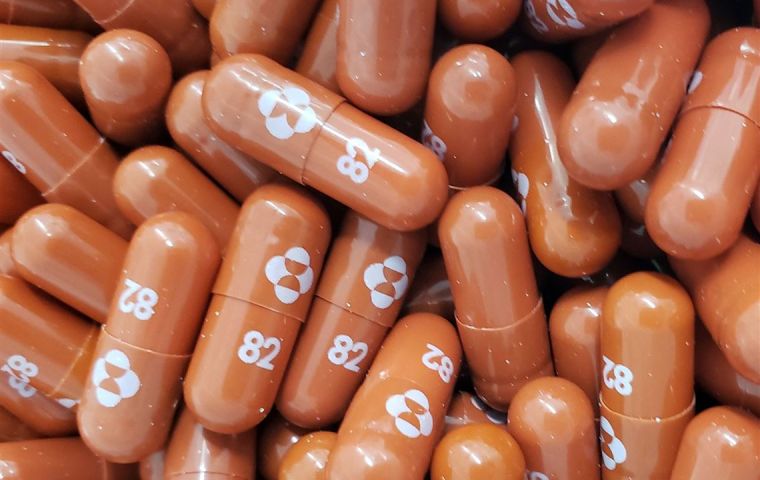MercoPress. South Atlantic News Agency
UK green-lights use of Merck's COVID-19 pill
 ”This will change the situation for the most vulnerable and the immunosuppressed,” Sajid Javid said.
”This will change the situation for the most vulnerable and the immunosuppressed,” Sajid Javid said. The United Kingdom Thursday became the first country in the world to authorize the use of molnupiravir, a pill developed by US laboratories Merck, to treat COVID-19.
“Today is a historic day for our country because the UK is now the first country in the world to approve an antiviral against COVID that can be taken at home,” said Health Minister Sajid Javid.
“This will change the situation for the most vulnerable and the immunosuppressed, who will soon be able to receive the revolutionary treatment,” he added.
The oral treatment was licensed for adults 18 and older who have tested positive for COVID-19 and have at least one additional risk factor for developing a serious disease, such as diabetes, obesity or heart disease.
The drug is intended to be taken twice a day for five days by people with mild to moderate Covid-19.
Molnupiravir is pending review by regulatory bodies in the US, the European Union, and other countries. The US Food and Drug Administration announced last month that it would convene a group of independent experts to examine the pill's safety and efficacy later this month.
For now, supplies will be limited. Merck has said it can produce 10 million treatments by the end of the year, but much of that supply has already been purchased by governments around the world.
In October, UK authorities announced that they had secured 480,000 doses of molnupiravir and that they expected thousands of vulnerable Britons to have access to the treatment by this coming winter through a national study.
Merck announced preliminary results last month that showed its drug cut hospitalizations and deaths in half among patients with early symptoms of coronavirus. The results have not yet been peer-reviewed or published in a scientific journal.
The company also did not disclose details about the side effects of molnupiravir, except that the rates of those problems were similar between people who received the drug and those who received placebos.
The drug attacks an enzyme that the coronavirus uses to reproduce, inserting errors into its genetic code that slows its ability to spread and take over human cells. This genetic activity has led some independent experts to wonder if the drug could cause mutations that lead to birth defects or tumours.




Top Comments
Disclaimer & comment rulesCommenting for this story is now closed.
If you have a Facebook account, become a fan and comment on our Facebook Page!